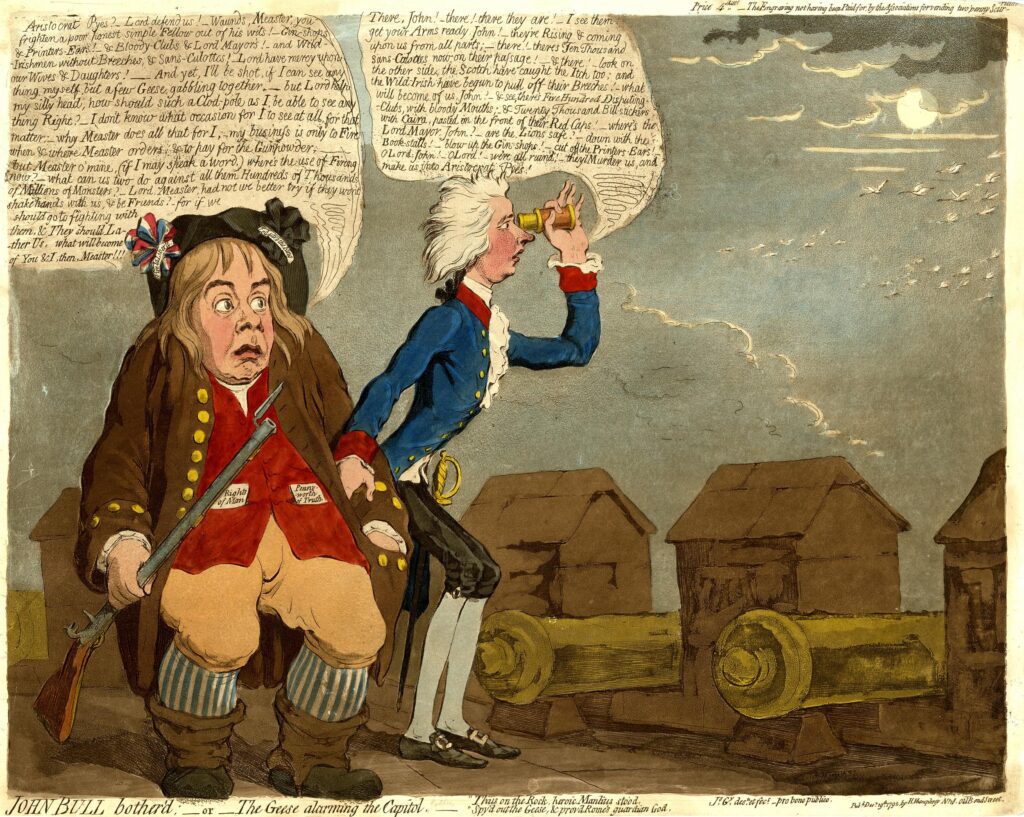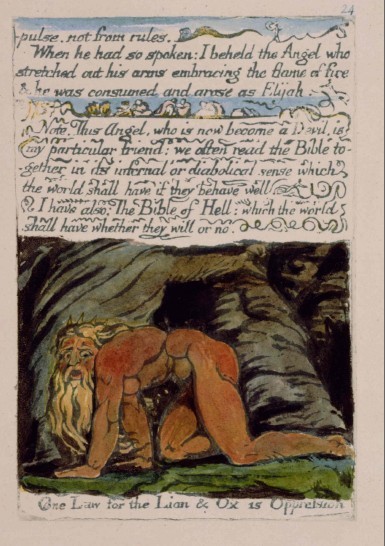Here is a passage–one of thousands from many sources–in which a member of the landed gentry expresses mild disdain for people who make their money by working. Since it’s by Jane Austen (Emma, chapter 22), it satirizes this prejudice without entirely eschewing it.
Philip Elton (a vicar, or priest) has rejected Emma’s friend Harriet as socially inferior and has returned to their community with a different fiancée on his arm. The narrator, partaking a little of Mr. Elton’s perspective, introduces this newcomer: “The charming Augusta Hawkins, in addition to all the usual advantages of perfect beauty and merit, was in possession of an independent fortune.”
But Emma “thought very little” of this lady.
What she was, must be uncertain; but who she was, might be found out; and setting aside the £10,000 it did not appear that she was at all Harriet’s superior. She brought no name, no blood, no alliance. Miss Hawkins was the youngest of the two daughters of a Bristol — merchant, of course, he must be called. … Though the father and mother had died some years ago, an uncle remained — in the law line — nothing more distinctly honourable was hazarded of him, than that he was in the law line; and with him the daughter had lived. Emma guessed him to be the drudge of some attorney, and too stupid to rise. And all the grandeur of the connection seemed dependent on the elder sister, who was very well married, to a gentleman in a great way, near Bristol, who kept two carriages! That was the wind-up of the history; that was the glory of Miss Hawkins.
(If Augusta’s uncle is a toiling “attorney,” then he is involved in trade, like his brother, whereas a barrister would be a gentleman.)
Emma’s distinctions are familiar from distant times and places. The varnas in Vedic Hinduism were the Brahmins (priests, like Mr Elton), the Kshatriyas (rulers and warriors of a class like Emma’s father), and the Vaishyas (who include merchants, like Augusta’s father), as well as the Shudras, or servants and laborers. Kshatriyas were not supposed to marry Vaishyas. Around 893 CE, King Alfred said that any realm needs three orders: “praying men, fighting men and working men.” The Four Occupations in ancient China were the shi (gentry and scholars), the nong (peasant farmers), the gong (artisans and craftsmen), and the shang (merchants and traders). Mande-speaking groups in West Africa have classified people as nobles, vassals, or as various specific craftspeople. And so on.
All these systems could be called “feudal.” It’s important to notice the differences among them and not to resort to a crude theory of universal “stages” in which feudalism always precedes capitalism. In fact, according to Arif Dirlik, “Marx’s remarks on feudalism,” which “were scattered throughout his work,” “were not meant to define a universal social type but only to describe the process whereby European feudalism was transformed into European capitalism.”
Nevertheless, we can imagine the general functions that are served by the distinctions in Emma’s mind.
First, most human beings have spent their lives working on the land to produce food. Land can be apportioned in many ways–for instance, it can belong to a village as a common resource or be traversed by nomads. But it has been common to allocate specific acres to individual owners.
Private ownership can concentrate so that a few people own most of the land. They might gain it by violent force, or it could accumulate due to luck, inheritance, and trade–or a mix of these. Emma’s family, the Woodhouses, “had been settled for several generations at Hartfield, the younger branch of a very ancient family.” Emma acknowledges that the “landed property of Hartfield” is just a “sort of notch in the Donwell Abbey estate,” which is vast. Nevertheless, the Woodhouses have a fortune “from other sources” (presumably, rents from other land) that “make[s] them scarcely secondary to Donwell Abbey itself,” and as a result, they have “a high place in the consideration of the neighbourhood” (ch. 16).
In any case, once land has concentrated, it is very much in the owner’s interests not to work but to live on the surplus of other’s labor, whether the laborers are employees, tenants, vassals, or serfs or slaves. (For Marx and Engels in the German Ideology of 1845-6, a feudal system specifically requires serfs, but I would ignore that detail.) Mr. Woodhouse is introduced as a “valetudinarian [overly anxious about his health] all his life, without activity of mind or body” (ch. 1). He evidently lives passively from the income of his estates and likes to “while away the morning” with “books of engravings, drawers of medals, cameos, corals, shells, and every other family collection” (ch. 6).
The many who labor may resent the few who don’t and may seek their land. Therefore, the landowning class has motivations to monopolize violence by training and arming themselves as professional warriors and employing military followers, by capturing the state if it is an effective mechanism of control, by promoting an ideology that justifies their status, by bequeathing each family’s land to one heir so that it doesn’t get diluted (primogeniture), and by restricting the size of their group by socializing and marrying only amongst themselves (endogamy).
These traditions have weakened by Emma Woodhouse’s time, but they still explain why many men in her circles pursue military careers and carry swords, why they dominate Parliament, why the gentry teaches and reinforces a cultural disdain for working with one’s hands, why they monopolize the main sources of ideology, such as the established Church of England, and why they prefer to marry their own. The function of these strategies is to preserve their ability to live well without working.
Emma must dramatically reassess her aspirations for Harriet once she learns that her friend’s late father had been a tradesman, not a landed gentleman:
Harriet’s parentage became known. She proved to be the daughter of a tradesman, rich enough to afford her the comfortable maintenance which had ever been hers, and decent enough to have always wished for concealment.—Such was the blood of gentility which Emma had formerly been so ready to vouch for!—It was likely to be as untainted, perhaps, as the blood of many a gentleman: but what a connexion had she been preparing for Mr. Knightley—or for the Churchills—or even for Mr. Elton!—The stain of illegitimacy, unbleached by nobility or wealth, would have been a stain indeed (ch. 19).
The novel is almost over by this point, but Emma retains a firmly feudal attitude toward inherited “gentility.”
A major complication is that there are rarely just two kinds of people: landowners and manual workers. As in the examples cited above, there may also be clergy, merchants, and manufacturers who produce at larger scales than craftspeople. What to do with these groups if you want to preserve the prerogatives of the landed gentry?
The clergy (or “men who pray”) can be handled in either of two ways. They can form their own caste, like Brahmans or (to some extent) priests in Orthodox Christianity. These men inherit religious endowments, much as the gentry inherit land. Priests and great landowners naturally cooperate, since they share stakes in the current system. Alternatively, the clergy can be denied the right to have legitimate heirs, as in Catholicism or Buddhist monasticism. Then each new cleric does not create a competitor to the gentry, but his career concludes with his death. Clerical positions are useful placements for the younger sons of gentry and for ambitious commoners.
(The English case was a complex hybrid, because some clerical positions provided income from land endowments, or “livings,” which could be retained by specific families, but others were more like jobs. Anglican priests can marry, but churches are not literally inherited.)
Merchants and manufacturers pose a different threat. Their segments of the economy can be more dynamic than agriculture, and some may build fortunes that become sources of power.
One response is to ignore them. In the Waning of the Middle Ages (1919), J. Huizinga notes that the wealth of advanced parts of medieval Europe like Burgundy came from trade and industry, Merchant-bankers were commoners, but they could have more power than monarchs. However, even though “nobility and feudalism had ceased to be really essential factors in the state and in society, they continued to impress the mind as dominant forms of life. The men of the fifteenth century could not understand that the real moving powers of political and social evolution might be looked for anywhere else than in the doings of a warlike or courtly nobility.” For instance, Georges Chastellain, a Burgundian chronicler, could only explain his realm’s prosperity as a result of its knights’ honor. Huizinga notes: “Chastellain still calls the rich burghers simply villeins.”
But this won’t work for long. If even a king needs loans to maintain his power, he can’t continue to treat his creditors like peasants. Another solution is to absorb the most successful merchants into the gentry by allowing them to buy land and live from rents and to marry their children to members of the landed class, as long as they stop trading. That proviso is important because it prevents their fortunes from continuing to grow rapidly, which would destabilize the system. This is what seems to have happened with Augusta’s family in Emma. Her father was a merchant (possibly involved in slavery), but her sister is said to have married a gentleman from the countryside, and she has landed a vicar for a husband. Any children she has with Mr. Elton will never have to work for income. But her £10,000 will not grow rapidly, because it will be invested in land.
Unfortunately for the landed gentry, the rewards of continuing to be a merchant can be high. If there’s an available ideology–such as Calvinism or Methodism–that justifies continuing to make money from trade and industry, then successful merchants may not want to retire to landed estates. They can keep getting richer, and they may be able to seize political power from the class whose wealth comes from passive land-ownership. This is the transition to capitalism that Marx observed. In the early 1900s, when Liberal parliaments voted high property taxes “to free the land that from this very hour is shackled with the chains of feudalism” (Lloyd George), it was clear that new classes of people had seized the state from the landed gentry and were even willing to bankrupt them.
Then again, even in the 21st century, some people still distinguish ordinary work from “professional” occupations that require liberal educations and that involve a lot of autonomy and reading, writing, and talking. Some parents who make money from trade or industry still give their children educations that inculcate values derived from the traditional gentry; then those children pursue professions that were considered respectable for gentlemen in Austen’s day, and they marry one another. It remains desirable not to labor at others’ direction but to spend one’s time, like old Mr. Woodhouse, reading and conversing–even if, nowadays, that usually means holding a job classified as “professional.”
See also: defining capitalism; the gentry as caste and class (from 2007); when chivalry died; the politics of Wind in the Willows; the neo-feudalism thesis; British exceptionalism 2: the unique nature of the aristocracy; David Brooks/Pierre Bourdieu; the links between capital and education.


